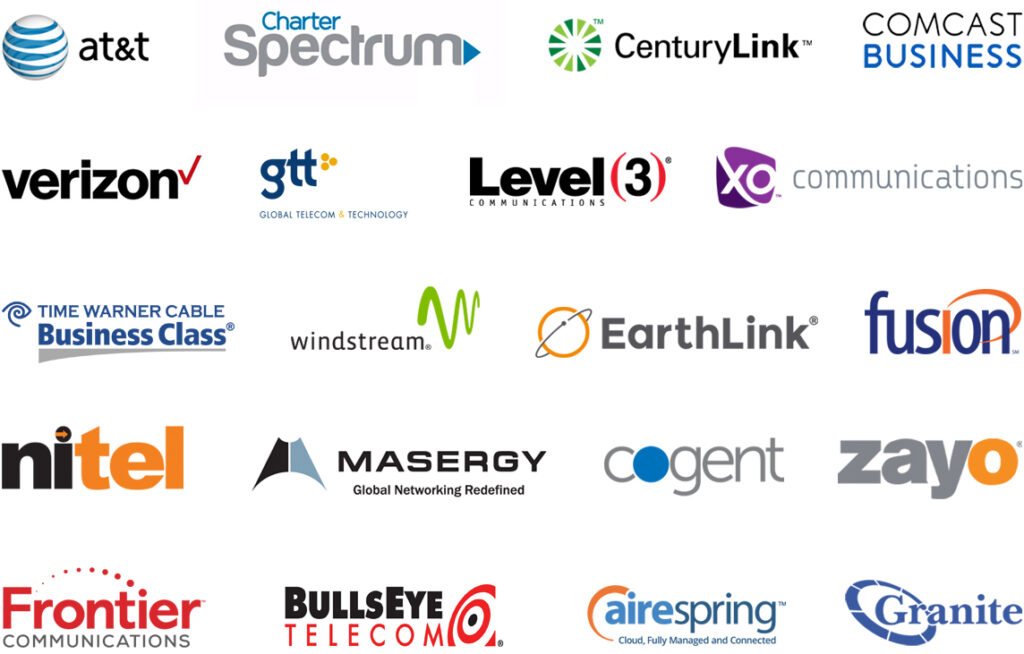Dealing with massive business internet carriers (CenturyLink, AT&T, CableOne also known as Sparklight, and Windstream to name a few), can often be one of the most time-consuming and painful experiences of your life. Our Carrier (business internet) Services division was created to solve these specific issues. We’ve seen it all.
1. Endless Hold Times and Poor Customer Support
One of the most common frustrations is the interminable hold times. When an internet issue arises, the last thing you want is to spend hours on hold waiting for customer support. Once you finally reach a representative, the quality of support can vary dramatically. Many customer service agents lack the technical expertise to resolve complex issues, leading to multiple transfers and repetitive explanations of your problem.
2. Lack of Accountability and Finger-Pointing
Business internet carriers often engage in finger-pointing when problems arise. If your internet goes down, the carrier might blame your equipment, your internal network, or even the weather. This lack of accountability can result in delayed resolutions and immense frustration as you try to navigate the blame game.
3. Slow Response Times for On-Site Support
When remote troubleshooting fails, you may need a technician to visit your site. Unfortunately, scheduling on-site support can take days or even weeks. During this time, your business operations may be severely impacted, leading to lost productivity and revenue.

4. Inconsistent Network Performance
Even with a contract in place, network performance can be inconsistent. Carriers often promise high-speed, reliable connectivity, but the reality can be far different. Frequent outages, slow speeds during peak times, and unexplained latency issues are all too common, leaving businesses struggling to maintain efficient operations.
5. Complex and Opaque Billing Practices
Understanding your business internet carrier bill can be a challenge in itself. Hidden fees, unexpected charges, and complex pricing structures are designed to confuse. This opacity can make it difficult to manage costs and ensure you’re getting the service you’re paying for.
6. Limited Options and Monopolistic Practices
In many areas, businesses have limited choices when it comes to internet carriers. This lack of competition can result in poor service and high prices. Carriers in monopolistic positions have little incentive to improve their service or customer support, knowing that customers have few alternatives.
7. Difficult Contract Negotiations and Renewals
Negotiating contracts with business internet carriers can be a daunting task. Carriers often lock businesses into long-term contracts with strict terms and conditions. When it comes time to renew, you may find that prices have increased significantly, and the negotiation process can be just as frustrating as the initial agreement.
8. Technical Jargon and Communication Barriers
The technical jargon used by business internet carriers can be overwhelming. Without a deep understanding of networking terms, it’s challenging to communicate effectively and ensure your needs are met. Miscommunications can lead to incorrect service setups, prolonged issues, and inadequate solutions.
How to Mitigate These Challenges
Despite these challenges, there are ways to mitigate the pain of working with internet carriers:
- Work with a Managed Service Provider (MSP): An MSP like DataTel can act as an intermediary between your business and the business internet carrier. They have the expertise to handle technical issues, negotiate contracts, and ensure you receive the level of service you need. Schedule a free consultation with our Carrier Services team to review your current circuits and carrier relationships to see what can be optimized.
- Document Everything: Keep detailed records of all interactions with your carrier. This includes phone calls, emails, and support tickets. Documentation can help hold the carrier accountable and expedite issue resolution.
- Regularly Review Your Service: Periodically review your internet service to ensure it meets your needs. This includes monitoring performance, reviewing bills, and evaluating the terms of your contract.
- Explore Alternative Providers: If possible, explore alternative internet providers in your area. Competition can drive better service and pricing.
- Invest in Redundant Solutions: To minimize the impact of outages, consider investing in redundant internet solutions. This could include a secondary carrier or a failover system to ensure continuous connectivity.
Working with business internet carriers can be a painful and frustrating experience, but understanding the common issues and challenges can help you navigate the process more effectively. By taking proactive steps and leveraging the expertise of professionals, you can mitigate many of the problems associated with carrier and network connectivity issues, ensuring your business remains connected and productive. Schedule a call with us to see how we can help save you money and prevent frustrating coordination and management of your circuits.


